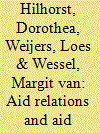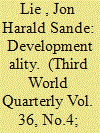| Srl | Item |
| 1 |
ID:
116858


|
|
|
|
|
| Publication |
2012.
|
| Summary/Abstract |
This paper considers mutual imaging of aid workers and Bhutanese refugees in Nepal. Based on a theoretical perspective of aid as a socially negotiated arena, the contextual and interactionist concept of imaging is used, rather than labelling (which is done to people), or perceptions (located in one actor's head). The paper uses a Q-methodology that symmetrically researches different groups of actors by posing the same questions. Our data confirm that the distinctions between the way aid workers and recipients view themselves, each other and the aid provided were more gradual than clear-cut between categories and that the legitimacy of aid workers is not determined by the perceived quality of aid. Problems with routinised aid were not translated into negative images, whereas problems with new and irregular types of aid were. Our research indicates the importance of the interaction between implementing staff and active beneficiaries. The roles of these active volunteers and incentive workers are important but ambiguous. They may smooth the divide between aid agencies and clients, but their proximity to the aid regime may also lead to tensions. The way these roles are played out and the effect this has on imaging and aid legitimacy is an area for further research.
|
|
|
|
|
|
|
|
|
|
|
|
|
|
|
|
| 2 |
ID:
139019


|
|
|
|
|
| Summary/Abstract |
The instituted order of development is changing, creating new power mechanisms ordering the relationship between donor and recipient institutions. Donors’ focus on partnership, participation and ownership has radically transformed the orchestration of aid. While the formal order of this new aid architecture aimed to alter inherently asymmetrical donor–recipient relations by installing the recipient side with greater freedom and responsibility, this article – drawing on an analysis of the World Bank’s Poverty Reduction and Strategy Paper (PRSP) model and its partnership with Uganda – demonstrates how lopsided aid relations are being reproduced in profound ways. Analysed in terms of developmentality, the article shows how the donor aspires to make its policies those of the recipient as a means to govern at a distance, where promises of greater inclusion and freedom facilitate new governance mechanisms enabling the donor to retain control by framing the partnership and thus limiting the conditions under which the recipient exercises the freedom it has been granted.
|
|
|
|
|
|
|
|
|
|
|
|
|
|
|
|